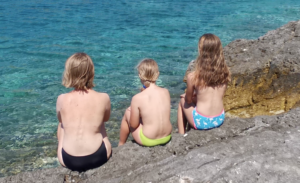- Introduction | Fragments for Borderless futures
- Elena Marchevska | There is no future
- Tara Fatehi Irani | a place to sit
- Syowia Kyambi | Holding Space
- Jade Montserrat | A text on borders dedicated to my Border Terrier (Jack Russell cross), Hilda, who will be one year old on 29 September 2021
- Manuel Vason | urgent images
- Vijay Mathew | How do we increase access and inclusion while powering down civilization?
- Sagar Shah & Jemima Yong | IN CRISIS: GET YOUR COMMS HEAD ON
- contributors + credits
- Download PDF
There is no future
☀Elena Marchevska

Caption: ‘Mare mater’, 2021, performance and video. Photo: Elena Marchevska
‘Taking hold of building alternative futures requires a commitment to having a future at all.’ Lewis Gordon1
I wonder how to start to think about a borderless future when we see so many new borders and control mechanisms being implemented daily. And how to think about the future, when certain events indicate that we have reached the end of the line, living the post-apocalypse already.
Perhaps, as Timothy Morton argues in their book Dark ecology: for a logic of future coexistnece2, in many ways the future is unthinkable.
Yet here we are, thinking it.
I find it hard to propose future ways of existing in this world, while living at the intersection of multiple eschatological crises (Covid, climate crisis, nuclear crisis)3. To think of borderless futures, from the perspective of a migrant artist4, requires cognitive de-linking from the current reality.
I deeply believe that our future is imprisoned by the capitalist tendency to think only through linear progress and time moving forward.
In many ways, my lived experience as a migrant has taught me that the linearity of progress never applies to those with ‘complicated’ names, ‘perceptively complex’ national/ethnic backgrounds and people of global ethnic majority.
Time for migrants and refugees is not moving forward; it simply stops and accumulates. As argued by Lisa Baraitser in her book Enduring time5, this is time conceived of as a viscous fluid, no longer a line with direction or purpose but a pool, the welling up of present time that will not pass and has no rim. Suspended time.
My pessimism about the borderless future comes from the fact that, due to systemic bias against migrant artists, just surviving absorbs so much of our energy. We are asked to maintain an art system (institutional and financial), that is deeply racist and colonial. Maintenance is about trying to keep something going but that also means it is not the time to be moving forward. Maintenance requires an attachment to now-time; of one moment looking much like the next. To maintain also means to underpin, to sustain.
Perhaps, there is no future?
Or we just need to imagine a different end of this world?
Sometimes it is useful to stop time and let the body remain suspended – like when you drift, floating on seawater, defying gravity. The sea that brought all our bodies onto this planet, the sea that takes so many migrant bodies back.
In my work, I always consider how my own migratory patterns might contribute to a way of living despite pervasive capitalism. How can I listen more closely to my homeland which carries intergenerational narratives of forced movement? What is the impact of such forces on my/our relationships to the future? I often lean into what Ayşe Güleç6 calls ‘migrant-situated knowledge,’ one that mediates between the fields of art and politics. This allows the migrant artist to expose practices of silencing on various societal levels and to combat these by making them un-ignorable: a form of ‘affirmative sabotage’.
And perhaps, if we sabotage the present, we can open a new borderless pluriverse.
A possibility for a future after all? ☼
1 Tlostanova, M. and Gordon, L. (2019) Shifting the geography of reason.
2 Morton, T. (2016). Dark ecology: for a logic of future coexistence. New York : Columbia University Press.
3 Horvat, S. (2021). After the apocalypse. Cambridge, UK ; Medford, MA : Polity.
4 About links between post-socialist and post-colonial dynamics, see the work of Achille Mbebme, esspacially: Mbembe, Achille (2020), ‘It might well be that the future of our planet will play out in Africa.
Also, about expansion of the decoloniality discussions to the fringes of Europe (Balkan accession countries and the Caucuses region) see the work of Madina Tlostanova, Bogdan C. Iacob and Manuela Boatcă among many others.
5 Baraitser, L. (2019). Enduring time. London: Bloomsbury Academic.
6 Güleç, A. (2018), ‘The Society of Friends of Halit. Migrant-Situated Knowledge and Affirmative Sabotage’, documenta studies #0.